Welcome to your guide for creating a well-rounded plant-based diet grocery list. This essential resource helps you stock up on whole grains‚ beans‚ nuts‚ seeds‚ and fresh produce‚ ensuring a balanced and satisfying diet.
Understanding the Basics of a Plant-Based Diet
A plant-based diet focuses on whole‚ minimally processed foods derived from plants‚ emphasizing variety and nutrient density. It includes fruits‚ vegetables‚ leafy greens‚ beans‚ legumes‚ whole grains‚ nuts‚ and seeds. Animal products like meat‚ dairy‚ and eggs are typically excluded or consumed in minimal amounts. This dietary approach prioritizes natural ingredients‚ avoiding refined sugars‚ oils‚ and highly processed foods. By centering meals around whole foods‚ a plant-based diet promotes high intake of fiber‚ vitamins‚ and minerals‚ supporting overall health and sustainability. It’s a flexible framework‚ allowing for personalization based on preferences and dietary needs. Whether adopting it fully or incorporating elements‚ understanding these basics helps in making informed choices for a balanced lifestyle.
Why a Grocery List is Essential for Success
A well-organized grocery list is crucial for maintaining a consistent and balanced plant-based diet. It ensures you never run out of essential items like fresh produce‚ whole grains‚ and legumes‚ which are the foundation of this dietary approach. Without a list‚ it’s easy to overlook key nutrients or rely on less healthy convenience options. Planning ahead also helps reduce food waste and saves time during shopping trips. By focusing on whole‚ minimally processed foods‚ your list becomes a roadmap for creating nutritious‚ satisfying meals. It also encourages budgeting and avoids impulse purchases‚ keeping you on track with your health and sustainability goals. A thoughtful grocery list simplifies meal preparation and ensures that every trip to the store contributes to a balanced and fulfilling plant-based lifestyle.
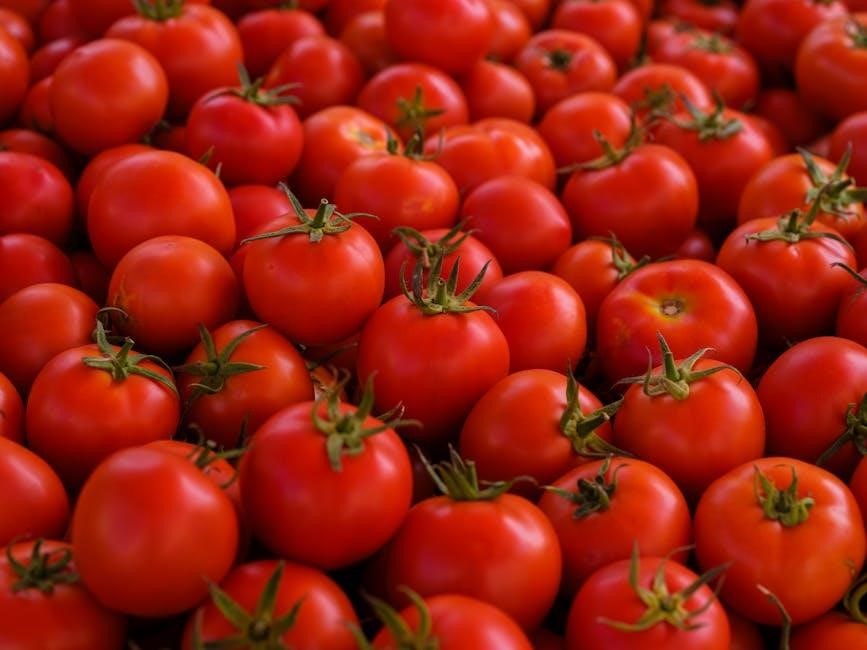
Core Components of a Plant-Based Diet
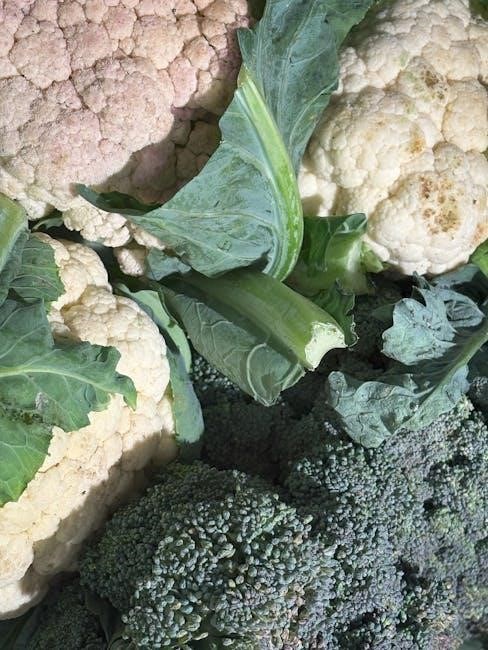
A plant-based diet focuses on whole‚ minimally processed foods‚ including vegetables‚ fruits‚ beans‚ legumes‚ whole grains‚ nuts‚ and seeds. These form the foundation of a balanced lifestyle.
Vegetables and Leafy Greens
Vegetables and leafy greens are the cornerstone of a plant-based diet‚ providing essential nutrients‚ fiber‚ and vitamins. Include a variety like broccoli‚ spinach‚ kale‚ carrots‚ and bell peppers for vibrant meals. Cruciferous vegetables and leafy greens are rich in antioxidants‚ while root vegetables like sweet potatoes and beets add natural sweetness. Dark leafy greens are packed with iron‚ calcium‚ and vitamins‚ making them a must-have. Aim to include a mix of raw and cooked options in your grocery list to ensure diversity and nutrition. These foods not only boost health but also add texture and flavor to salads‚ soups‚ and sautéed dishes.
Fruits
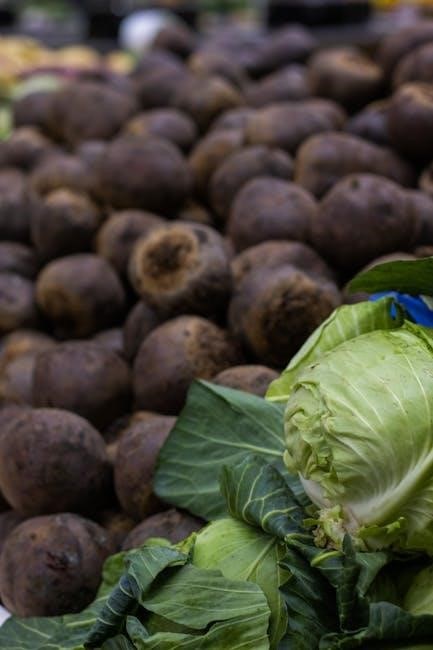
Fruits are a vibrant and nutritious addition to a plant-based diet‚ offering natural sweetness and a wealth of vitamins. Include a variety of seasonal fruits like bananas‚ apples‚ and pears for everyday snacks. Berries such as strawberries‚ blueberries‚ and raspberries are rich in antioxidants and perfect for adding to oatmeal or salads. Tropical fruits like mangoes and pineapples bring exotic flavors‚ while citrus fruits like oranges and lemons provide a refreshing burst of vitamin C. Consider frozen options for convenience and year-round availability. Fruits are versatile—enjoy them as snacks‚ blend into smoothies‚ or use in baked goods. They contribute essential nutrients‚ fiber‚ and hydration to your diet‚ making them a must-have on your grocery list. Aim for a mix of colors to maximize the intake of different vitamins and antioxidants.
Beans and Legumes
Beans and legumes are a cornerstone of a plant-based diet‚ providing an excellent source of protein‚ fiber‚ and essential minerals. Include a variety of options such as lentils‚ chickpeas‚ black beans‚ and kidney beans in your grocery list. These versatile ingredients can be used in soups‚ stews‚ salads‚ and main dishes. Canned versions offer convenience‚ while dried beans require preparation but are often more cost-effective. Lentils‚ for instance‚ are a quick-cooking option‚ making them ideal for weeknight meals. Additionally‚ legumes like peas and edamame add texture and flavor to various recipes. They are also rich in plant-based iron and zinc‚ making them a nutritious addition to your meals. Stocking your pantry with a diverse selection ensures you have plenty of options for creating balanced and satisfying dishes.
Whole Grains
Whole grains are a vital component of a plant-based diet‚ offering nutrients‚ fiber‚ and sustained energy. Include a variety of options like brown rice‚ quinoa‚ oats‚ bulgur‚ and barley in your grocery list. These grains provide essential vitamins‚ minerals‚ and antioxidants. Quinoa is particularly versatile‚ serving as a protein-rich base for meals. Oats are perfect for breakfast dishes‚ while barley adds texture to soups and stews. Brown rice is a great source of fiber and can accompany a wide range of dishes. Stocking whole grains ensures you have a foundation for balanced‚ nutritious meals. They are also budget-friendly and can be prepared in countless ways to keep your diet diverse and satisfying. Incorporating whole grains into your meals supports overall health and wellness.
Nuts and Seeds

Nuts and seeds are versatile and nutrient-dense additions to a plant-based diet‚ offering healthy fats‚ protein‚ and fiber. They are perfect for snacking‚ adding crunch to meals‚ or blending into smoothies. Almonds‚ walnuts‚ chia seeds‚ flaxseeds‚ and hemp seeds are excellent choices. These foods are rich in omega-3 fatty acids‚ which support heart health and brain function. Sunflower and pumpkin seeds provide zinc and magnesium‚ while sesame seeds are a great source of calcium. Nuts and seeds can be stored for long periods‚ making them convenient staples. However‚ they are calorie-dense‚ so moderation is key. Incorporate a variety into your grocery list to enhance flavor‚ texture‚ and nutritional diversity in your meals. They also serve as excellent bases for dairy-free milks and butters‚ adding versatility to your plant-based lifestyle.
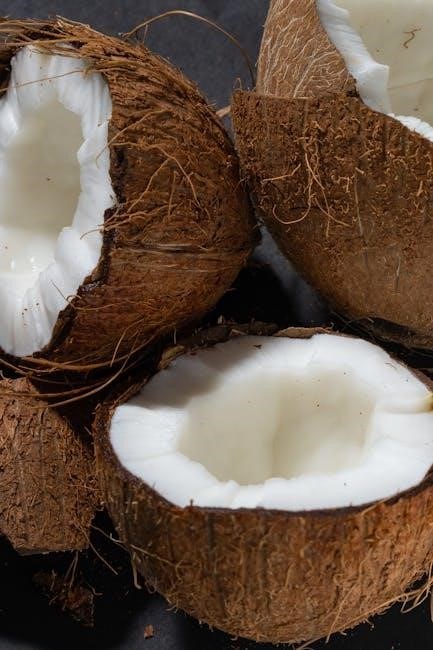
Additional Essentials for Flavor and Variety
Enhance your meals with fresh herbs‚ dried spices‚ and convenient plant-based products. These items add depth and variety to your dishes‚ making your diet more enjoyable.

Fresh and Dried Herbs
Fresh herbs like basil‚ cilantro‚ and parsley add vibrant flavors to dishes‚ while dried herbs such as oregano and thyme provide lasting seasoning. Incorporating herbs enhances meals without added oils or salts. They are versatile for marinades‚ dressings‚ and garnishes‚ making them indispensable in a plant-based kitchen.
Dried Spices
Dried spices are a cornerstone of flavor in a plant-based diet‚ offering endless possibilities to enhance meals without relying on oils or salts. Staples like cumin‚ paprika‚ turmeric‚ and chili powder add depth to dishes‚ while cinnamon and nutmeg provide warmth to sweet recipes. Black pepper and cayenne pepper are excellent for adding a sharp‚ aromatic bite. Dried spices are also versatile‚ complementing everything from hearty stews to vibrant salads. A well-stocked spice rack ensures you can experiment with global cuisines‚ from Mexican to Indian flavors. Always opt for high-quality‚ organic options to maximize flavor and nutritional benefits. Organize your spices for easy access‚ and consider refilling or replenishing them every few months to maintain freshness and potency.

Convenience Foods
Convenience foods can be a lifesaver for a busy plant-based lifestyle‚ offering quick and easy meal solutions. Items like vegan bread‚ bagels‚ and pasta are staples that simplify meal prep. Pre-cooked grains‚ such as quinoa or brown rice‚ save time during weeknight meals. Canned beans and tomatoes are versatile and can be used in soups‚ stews‚ and salads. Nutritional yeast is a popular choice for adding cheesy flavors to dishes. Vegan snacks like energy bars‚ trail mix‚ and roasted chickpeas provide healthy on-the-go options. Even plant-based milk alternatives and ready-to-eat vegan meals can be included for convenience. While these foods are handy‚ always read labels to ensure they align with your dietary preferences and health goals. A balanced mix of convenience and whole foods keeps your diet practical and enjoyable.

A well-organized plant-based diet grocery list is your key to maintaining a balanced and nourishing lifestyle. Use it wisely to explore flavors and embrace healthier choices effortlessly always.
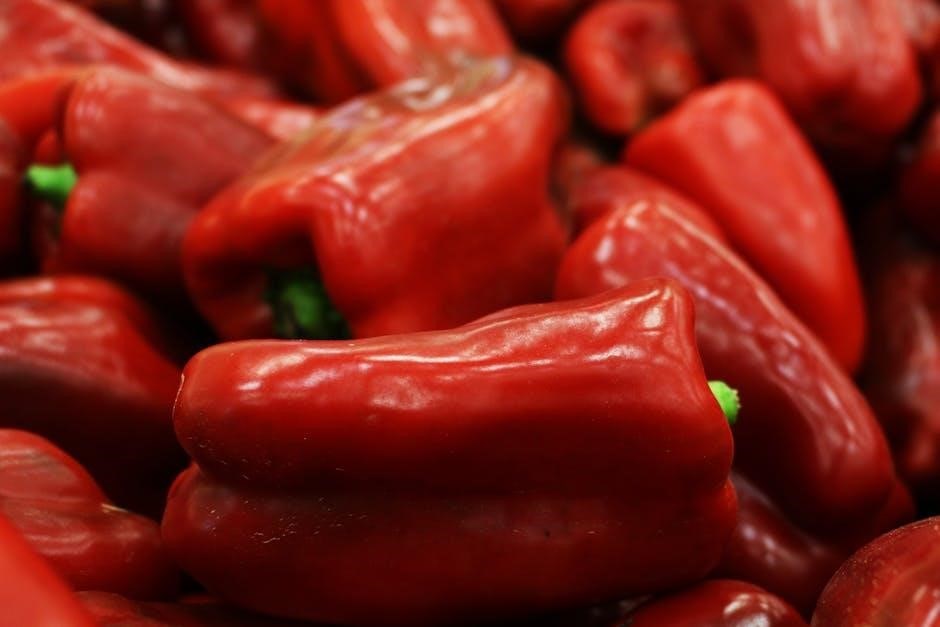
How to Use Your Grocery List Effectively
To maximize your plant-based diet grocery list‚ start by planning meals for the week. This helps avoid impulse buys and ensures you use all ingredients. Group items by store sections‚ like produce‚ grains‚ and spices‚ to streamline shopping. Check expiration dates and stock levels to minimize waste. Prioritize seasonal fruits and vegetables for freshness and cost-effectiveness. Keep staples like beans and grains on hand for quick meals. Finally‚ review and update your list regularly to reflect changing preferences and dietary needs. This organized approach makes adopting a plant-based lifestyle simple‚ efficient‚ and enjoyable.